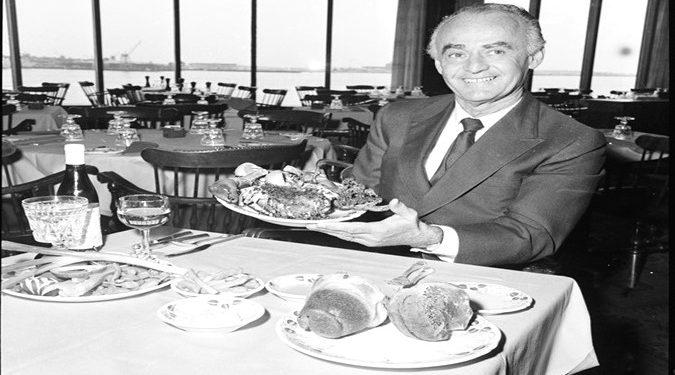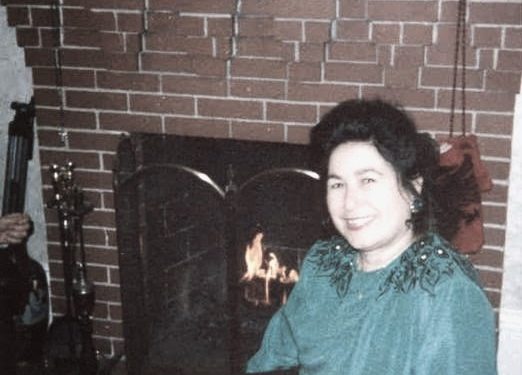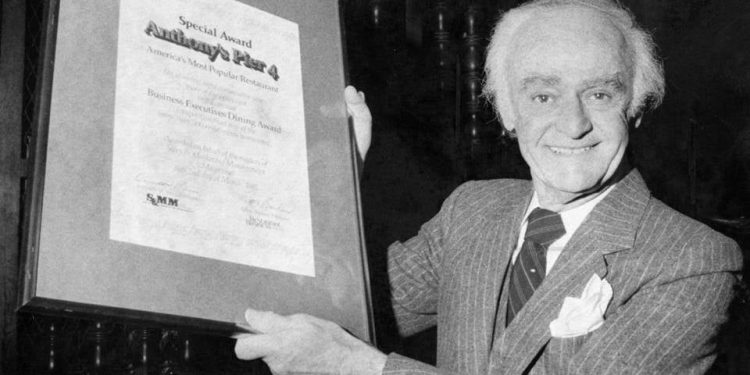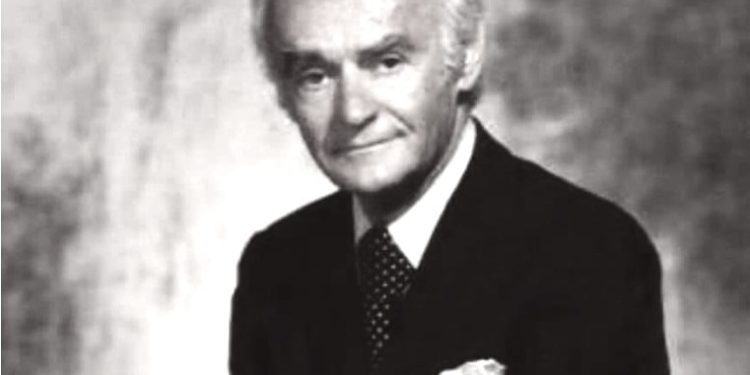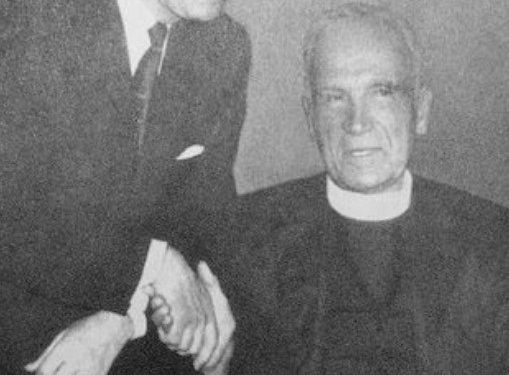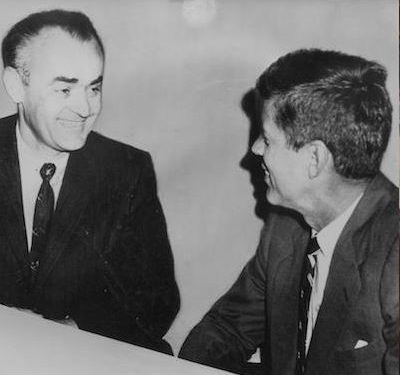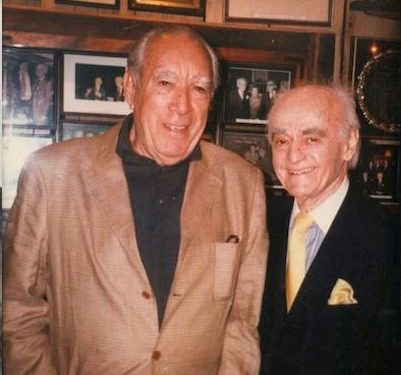– REQUIEM FOR ANTON ATHANASI, AN ICON OF BOSTON –
Memorie.al / It was the afternoon of Friday, May 20, 2005, when, on the phone, my American friend, Ann Negri, informed me that Anton Athanasi had passed away. I turned on the local news broadcast on TV and was faced with the photograph of the deceased: young Anthony, in a blue suit, with a composed look, a sincere smile, his characteristic two black eyebrows and penetrating eyes. The news anchor repeatedly announced: “Anthony, the Albanian restaurateur, founder of Antony’s Pier 4, a distinguished and respected representative of one of the most magnificent generations of the Lynn and Boston community, who once said: ‘Hard work’ built this place (America)” …! He fought for three years with Alzheimer’s disease until it finally defeated him…!
A feeling of honor and pride, mixed with sobbing, washed over me. I stood for a few minutes by the window, where, across the rocky massif on the edge of the ocean, stands majestically one of their renowned restaurants, “Anthony’s Hawthorne-by-the-Sea” in Swampscott. The white ocean waves approached one after another and gently hit the castle-like walls of the building, as if bringing condolences for the loss of its owner.
I recall a fall day in 1994 when I stood bewildered and astonished in the lobby of the “Pier 4” restaurant in Boston, admiring for the first time that luxury and wealth, unable to believe that such an aristocratic complex belonged to a compatriot!
-“Hey, Albanian girl, have you come to look for a job too?”
I turned around immediately and found myself face to face with Mr. Athanas, who was smiling kindly. “- We only have openings in the kitchen, but it’s hard work for you ladies…!” In the early 1990s, the first Albanian immigrants rushed into the culinary industry. Anton Athanasi’s restaurants opened their doors and employed dozens of Albanian boys and girls.
-“I am a journalist,” I quickly said, “I would like to interview you…”!
He replied: “Welcome,” shook hands with me, and invited me to sit on a couch near the giant fireplace, where two logs were burning.
-“Listen here… where are you from?”
-“From Korça… we are both patriots!”
-“I am a patriot with all Albanians… but know that I don’t have time… I have my minutes counted.”
He made to get up, and I bombarded him with questions.
-“I’m sorry, I told you I don’t have time!” He greeted me politely and hurriedly climbed the stairs where two waitresses were waiting for him.
That autumn, for the traditional celebration of November 28th, the Albanian-Americans of Boston gathered, as every year, to celebrate Flag Day at “Pier 4.” The halls and interiors of the restaurant were adorned with national flags and colorful lights, which gleamed against the blue backdrop of the ocean beyond the windows. As I climbed the stairs covered in burgundy velvet, I spotted Mr. Anton Athanas, who was struggling to carry a large table, assisted by a waiter. We invited guests who were coming for the first time stood mouth agape at that scene. I approached Mr. Anton and whispered to him, “Isn’t there another waiter available for this job?”
As soon as he saw me, he remembered our interview and cut me off: “We are extremely busy… a lot of guests have arrived… we need tables…”! More tables were needed every year to celebrate November 28th at “Pier 4,” as people flocked to that grand event in the modern restaurant’s premises, with abundant and fine food, welcomed with love and respect by Mr. and Mrs. Athanas.
A year later, on a day in November, when I rang the secretary of “Pier 4” to reserve tickets for the celebration, I heard a man’s voice answer:
-“Don’t speak English,” he said, “I can tell you’re Albanian.”
It was the voice of Anton Athanas. He asked for my name and how many tickets I wanted.
-“Excuse me, sir, but why does it have to be you handling the guest list…?!”
-“Because the secretary has gone to the bank, and I’m staying by the phone until she returns.” He laughed because he recognized me by name, and, apologizing, he said:
“Now, if you want, we can chat since I’m in quiet… but keep it brief.”
I was taken aback for a moment. I did not have any paper or pencil nearby. Before I could collect myself, he began to speak slowly and with humor, complaining that he avoided interviews with journalists, who often “stole” his time. I asked him if he remembered the first day he arrived in America, and he replied: “Yes.” Anton Athanasi saw the Statue of Liberty for the first time in 1915, at the age of 5.
-“Did you think a lot before starting your first business?” I asked.
“Americans use a similar expression: ‘When he does it, why shouldn’t I?’ That was the first push…! When you start work without fear, when you embrace failure, and when you are not satisfied with what you have achieved, keep going… keep going… because you have a clear path ahead,” he replied.
-“Why did you choose to go into the restaurant business?” I asked.
“Because it’s the easiest way to start a business,” he answered. “You rent a place, start buying food, cooking, and selling it. Later, with the profits, you buy the place and expand the business. The Italians and Greeks, who started before us, gave us good experience!”
-“You mentioned expanding the business; is it achieved so quickly?” I asked.
“It’s not achieved so easily…! Listen now… I can make a comparison with what the Bible says…! You can build a house on sand very quickly, but building a house on rock is difficult and requires effort. When the storm comes, the sandy house gets destroyed and is pushed away, while the house on the rock remains intact…! I don’t work just to get by today…! I ‘build on the rock,’ I work hard and think about the future…”
“My father,” I said, “when he left Albania for America, traveled almost at the same time as you and along the same route, from Korça to Piraeus, Greece, with horses, and then onward by ship. He also worked hard and bought a restaurant in Detroit…! All my life, I’ve been curious about how we would have lived if my father had taken us with him to America…”
“Maybe today you wouldn’t be holding a pen but a knife in the restaurant kitchen,” he said humorously. I was struck by the thought that our family might have gone through the same difficult and surprising journey as the Athanas family, from the day of arrival in the “promised land”! Anton’s parents settled in New Bedford and found work in a cotton factory with a low wage, while young Anton helped his uncle sell fruits and vegetables from a cart he pushed by hand in Faneuil Hall, where ‘Quincy Market’ stands today.
“My mother,” Antoni sighed, “from a young age taught me to be hardworking, a good host, and to serve my peers. My father, Simoni, insisted that I not waste time. He would give me a basket of bananas and tell me: ‘If you don’t sell all the bananas, don’t come home.’ I would rack my brain figuring out how to manage. I would position myself on both sides of the bridge, where there were more passersby, and I managed to sell them all. Thus, I had a little free time to return home and do my homework.”
Anton Athanasi loved his mother very much and continued to remember and respect her after her death. In one of his offices, a portrait of Evangjelia Athanas hangs on the wall. He wanted to build a large hospital in Albania in her name…! Antoni also mentioned his mother for another reason. He declared before journalists and in public spaces that it was precisely his mother who brought the seed for the “kos” (a type of yogurt) on a ship from the village of Trebickë, and he referred to it as: “Our Culture.” “We Albanians brought the seed for the ‘kos’ to America”…! It was the essence of his homeland; the traditions of the Albanian family began to take root slowly on the new continent as they traveled across the Atlantic.
At the age of 13, Antoni left school and found work in a factory in Bedford. His job was to light the stoves with wood and coal for the bosses’ offices, a task he also performed at home, along with his siblings. He worked 7 days a week, bringing home $12. Later, he worked as a busboy and waiter in one of the city’s popular restaurants. He was the first Albanian-American to work in that restaurant, and when he returned home from his first day of work, he was applauded by family and friends.
Fifty years later, in a speech delivered at Faneuil Hall, before more than 400 attendees, he said: “If you think I am successful now, you should have seen me then.” At the age of 14, he worked as a dishwasher, but a long workers’ strike weakened Bedford’s economy, so Antoni moved to New York, where he worked at another uncle’s restaurant. There, Antoni did all kinds of jobs that a restaurant has, except for office work, which he didn’t care much about during his life’s endeavors.
Then came a day when, with his earned savings, he opened a small 45-seat restaurant in New York, with staff for two, providing counter service. But this significant step in his life was quickly interrupted because, unfortunately, his father passed away, and he was forced to return to Bedford as soon as possible. The 20-year-old son worked in New Bedford, initially as a waiter, and later as head waiter, helping his family with his saved $3,000.
…”I had a close friend,” Antoni concluded, “we were both from Korça and of the same age; his name was Vasil. I often shared my troubles with him and talked about the projects I had in mind. One day, we went to the beach; we were both young men who liked swimming in the ocean…! Lying on the sand, looking at the sky, I told Vasil that I wanted to open a small place in Lynn. ‘Hot Dog.’ He liked my idea and encouraged me…”
Lynn is mentioned as an industrial center near Boston and as a city with a large immigrant population. The first residents were English, later Irish, Italians, French-Canadians, Greeks, Armenians, and others, who worked in the shoe factories. Antoni had calculated that opening a “Hot Dog” stand near these factories would generate significant revenue and bring in large profits. He didn’t let his desire weigh on him for long and opened such a place in Lynn.
The business was doing well, but it lasted only a few months. It was the time of the economic depression that engulfed all of America; establishments and shops quickly went bankrupt, and owners sold them for very low prices. With his trader’s intuition that never deceived him, Antoni quickly sold the “Hot Dog” and bought at auction the most beautiful restaurant in Lynn.
Determined to establish a visually appealing and “first-class” restaurant, in 1938, he opened “Anthony’s Hawthorne” in downtown Lynn. “Hawthorne” had closed during the economic depression, but it created an opportunity for Antoni, who found it for two to three thousand dollars. By the end of the first year, Athanasi earned $23,000. In the early 1950s, “Anthony’s Hawthorne” became the largest capacity restaurant in all of Massachusetts, with profits exceeding one million dollars a year.
According to chronicles, Athanasi, although working 7 days a week, found time to engage in patriotic activities, participating in conferences and rallies primarily organized by “Vatra” and other diaspora organizations. He felt proud when he met fellow countrymen and learned about the successes they had achieved in business, the acquisition of a profession, or in university graduations.
In a speech delivered at the Albanian Festival of Boston in May 1975, Antoni Athanasi said among other things: “…I consider myself proud to be Albanian… there are many things for which I am grateful and thank my homeland…! I consider myself privileged to have grown up ‘in the embrace of my mother’ in my family, which educated me according to Albanian customs and traditions…! I consider myself fortunate to have known Bishop Noli, Faik Konica, and other patriots who began the second Renaissance of Albania…! Their ideal was the brotherhood of Albanians, regardless of faith or ideology… something that was also supported by St. George’s Cathedral, led by Father Noli…!”
Furthermore, Antoni Athanasi praised the great work and activity carried out by “Vatra” and “Dielli” in creating the Albanian-American community and its institutions, aiming to educate the ethnic group of Albanians so that each of them would become a good American citizen. His love and pride for his homeland brought Antoni close to “Vatra,” at the head of which he remained for several years.
THE LEGEND OF “ATHANAS”
In the Boston area, if you tell an American, “I’m Albanian,” they will respond: “Like Anthony?” Such is the familiarity and popularity of his five restaurants, the “Athanas” name has become legendary. Currently owned by the Athanas family are: “Anthony’s Hawthorne” in Lynn, which opened in 1938; “Hawthorne-by-the-Sea” in Swampscott, which opened in 1947 and has since expanded to include “Anthony’s Pier 4 Café”; “The General Glover” in Marblehead, which opened in 1957; “Anthony’s Pier 4” in Boston Harbor, which opened in 1963; and “Cummaquid Inn” in Cape Cod, which opened in 1975.
Across all the restaurants, approximately 800 employees are currently employed. Since the early 1990s, a large number of waiters have been Albanian immigrants, whom Antoni selected based on skills, professional appearance, and dexterity. The Albanian-American customers who frequent the Athanas family restaurants have always felt at home, communicating in Albanian with the waiters and other service staff, especially due to their uniforms (red vests and jackets, black pants), which resemble our national flag.
Throughout the decades of restaurant operation, Antoni placed great importance on the physical appearance and behavior of the waitstaff. It is said that near the kitchen door of the restaurant, he hung a large mirror with a sign underneath in big letters: “If you don’t look good, don’t go out this door”! The waiter, loaded with plates on a tray, needed to check himself in the mirror before serving the customer. This may seem like a small detail, but it contributed to increasing the profits of the “Athanas” restaurants. With this diligence and discipline, so too have his sons worked.
Today, the family restaurants are managed by Antoni’s four sons: Anthony Jr., Michael, Robert, and Paul, who grew up alongside the business. They are involved in both sectors of the establishment, in the back of the house (kitchen) and in front of the house (offices). They began as busboys and waiters and reached the position of manager. The entrepreneurial brothers work as a single team to further the honor and glory of the Athanas family.
Building “Pier 4” in Boston Harbor, a “boat-restaurant,” was a dream of Anton Athanasi, which began back in 1959 when he bought the land of an old railway in a deserted area of Boston. Today, it stands majestically as a renowned restaurant not only in America but all over the world. The construction and completion of the premises and interiors were finalized in 1963. Antoni inaugurated the restaurant just days before the tragic assassination of American President Kennedy, a fact that has remained in the memory of Americans.
In the first year of operation for the “Pier 4” restaurant, Antoni, with his cunning, invited all Boston taxi drivers to a free dinner, calling them in for coffee whenever they happened to pass by. This gesture paid off well: the drivers began bringing clients in their taxis, offering them a wonderful day at a restaurant that was still relatively unknown, where customers were indeed satisfied and began promoting the place. Year after year, “Pier 4” became a magnet attracting movie stars, print media, television, political leaders, and festive celebrations from around the world. On the boat-restaurant, the first Albanian flag was displayed, along with flags from all over the world.
The walls of the restaurant’s lobby are filled with photographs of famous visitors to “Pier 4,” including Elizabeth Taylor, Merv Griffin, Johnny Carson, Don Rickles, Joe DiMaggio, Judy Garland, and Wayne Newton. The elite of Boston’s politicians consider “Pier 4” their meeting place, especially during election campaigns, with senators and congress members regularly visiting. Hundreds of celebrations of Albanian national holidays and other important meetings of the Albanian-American diaspora from across America have also been organized there, especially during November festivities.
From 1963 until 1981, the annual revenues of “Pier 4” reached up to $12 million. In 1984, approximately 700,000 food portions were served each year in this restaurant, and it was ranked as the 50th most successful restaurant in America. For 40 years, Anton Athanasi was a prominent figure in local and national culinary organizations. He earned numerous accolades, awards, and honors, including the “Silver Plate Award” from the International Foodservice Manufacturers Association. Antoni Athanas, the founder and president of the family’s elegant restaurants, is one of Boston’s most distinguished business figures. Athanasi climbed step by step to become a model of America in the restaurant industry, embodying the realization of the American dream.
In 1967, “Pier 4” in Boston was recognized as one of the largest restaurants in America, and Anton Athanas was honored with the “Golden Door Award” from the International Institute of Boston and the “Business Executives Dining Award” for three consecutive years. Anton Athanas also served as president of “The Massachusetts Restaurant Association” and as a board member of “The National Restaurant Association,” which named him “Businessman of the Year” in 1976. But with his humor, Antoni always repeated the proverbial phrase:
“I’m as good as my last meal…!” The list of awards and decorations he received is endless. He was honored with an “Honorary Doctor of Business Administration degree” from Southeastern Massachusetts University in 1977; a “Diploma of Honor” from the National Institute for the Foodservice Industry in 1983; “Honorary Doctorate degree” from the International Institute of Culinary Arts in Massachusetts; “The Lifetime Achievement Award” from the Massachusetts Hospitality Association in 1999; as well as honors from dozens of organizations and institutions where Mr. Anton holds a place of honor.
Until the last days of his time at “Pier 4,” he worked day by day, 7 days a week, arriving at the restaurant around 10 a.m. on regular days, and at 7 a.m. on festive days, staying there all day. On weekends, he worked until midnight. He inspected the large kitchen every morning before the other employees arrived. In an interview with a journalist, Athanasi said: “I relax with what I do. In short, I relax by working. I leave it to life to let go—this is my philosophy.”
At the height of its glory in the 1960s and 70s, “Pier 4” became the place where powerful political elites, politicians, bankers, judges, athletes, movie stars, and various celebrations gathered. Antoni Athanas, a “multi-millionaire” who earned his money through hard work and sweat, not given or inherited, always humorously recalled his journey on a small donkey at the age of 5 as the beginning of his path to America. Many years later, when driving his “Mercedes,” he said: “A car isn’t anything special to me, it’s just a thing, a tool, that takes you here and there, and that’s all. But, damn it, it gets you there faster than a donkey…!”
I believe he was a pioneer and an example for all of us; he bought the site for “Pier 4,” which no one would have wanted to buy, and he was the only one who thought about how he would change that environment, solely with his imagination…! There, his fate was determined, or rather, fate guided him…! People came and dined with him as if drawn from a dream, year after year. It happened that guests waited another two and a half hours to get a table. He attracted not just America’s attention!/Memorie.al




